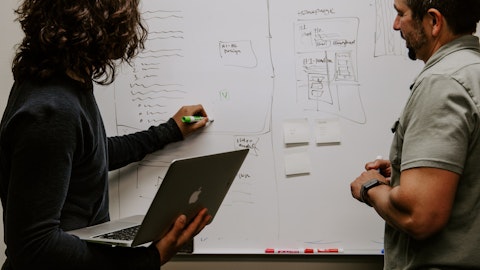Jon Kirchner: Yeah. Matt, I would say that certainly the strikes have had limited impact on our business thus far. And part of that just has to do with the volume mix we have from different customers that is slightly or is weighted more favorably towards foreign customers rather than some of the U.S., although we do business pretty well across the board. The other thing I would say is that we’ve seen certainly supply chain improvements and whatnot. I think the — so net-net, it hasn’t had too much of an impact on us thus far this year, nor do we expect it on balance in 2023. As you look ahead into 2024, with improved supply chains and the strikes behind you, I think we’re watching closely and we’ll continue to because you’ve got higher interest rates and consumer confidence, maybe not in a great place and how that ultimately impacts demand.
But I think it’s fair to say as we sit here based on the market data that I’ve seen that wouldn’t necessarily look into 2024 with big concerns about major changes. But on the other hand, I think we’ll be looking to get a finer point of view on that as we get into providing guidance for 2024 and study some of the industry data coming out of Q4 and into next year.
Matthew Galinko: Thanks. That’s helpful. And then as a follow-up, I think Robert mentioned some narrowing of the EBITDA guidance based on incremental investments across a couple of business lines. Can you just repeat what you mentioned there? And maybe go into a little bit more detail around what those investments are? And if they’re kind of short term in nature, if there’s — if they’re going to be kind of permanent in nature? Thanks.
Robert Andersen: Sure, Matt. So the numbers that I gave are 6% to 8% for adjusted EBITDA margin for the year. That has a mid of 7%. And previously, we had 6% to 10% with the mid of 8%. So, down roughly 1 percentage point from our prior guidance. It’s not a huge amount of money when you get down to it. But we have focused our efforts on TV OS and the AutoStage wins. And the driver here is really to make sure that we are balancing our investments to drive growth while being mindful about profitability. So I think we wanted to make sure that we had properly funded the initiatives. Any additional color you want to add to…
Jon Kirchner: Yeah. I would say two things. As far as permanent versus transitory, I think some of it is transitory as you start up customers more quickly and work with them to get into the marketplace as aggressively as possible. So I think over — and you’ll see this as we get into 2024, we expect EBITDA expansion, and we’ll have a lot more to say about that in 2024. And I think the other thing behind it is I don’t think it’s as simple as thinking about it just in terms of that slight difference because the investments obviously are more material than that slight difference. So as a result, we’ve obviously made other changes within the business to help, if you will, fund and support those things. So we’re being far more active across the board.
The net result in this case was as Robert described it. But I think as we look ahead, we’re going to enjoy the benefit of faster revenue growth and penetration in these two key areas as a result of some of the decisions we’ve made in the business we’ve won in some cases, that is faster and more than we expected originally in our 2023 plans. And I think that’s a great thing as we look ahead into 2024 and 2025.



